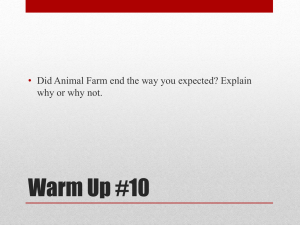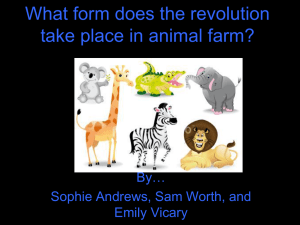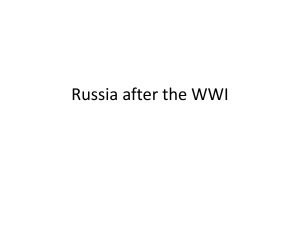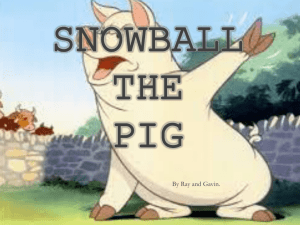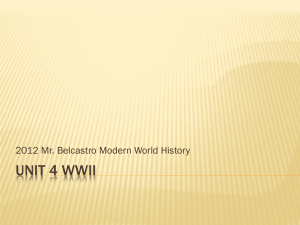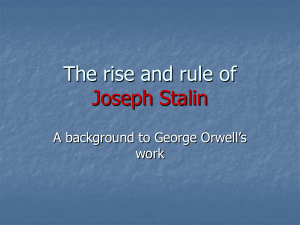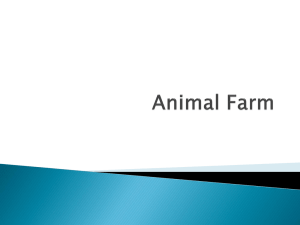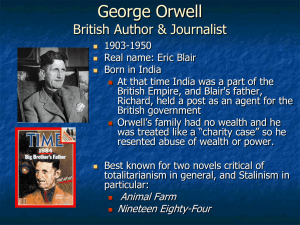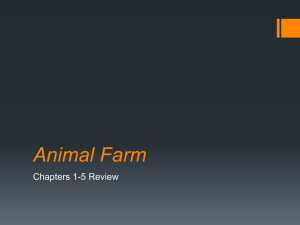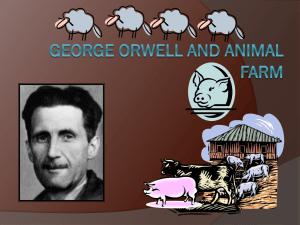Warm Up #9
advertisement
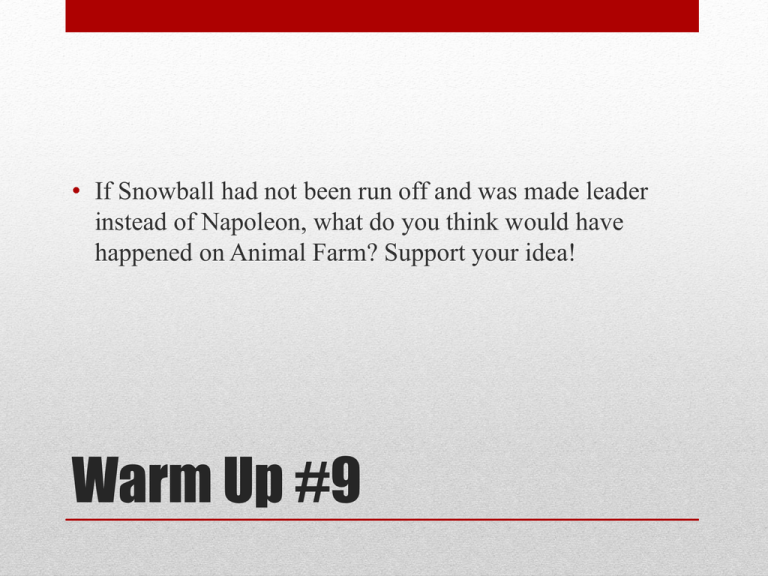
• If Snowball had not been run off and was made leader instead of Napoleon, what do you think would have happened on Animal Farm? Support your idea! Warm Up #9 SENIOR PROJECT Due today: #9 Due Next Class: #10 Animal Farm George Orwell • Answer the following questions: • • • • • • • • • • • • • • • • 1. Why are the animals directed to meet? 2. What type of animal is Old Major and how old is he? 3. What political philosophies are revealed by Old Major’s dream? 4. What “rules” does Old Major want to establish when the animals have conquered the world? 5. What kind of person is Mr. Jones? Why don’t the animals like living on his farm? 6. Describe Napoleon and Snowball. How are they similar? How are they different? 7. What are the basic principles of Animalism? How do the animals respond? 8. What is Sugarcandy Mountain? 9. What incident(s) incite the rebellion? 10. What new skill do the pigs teach themselves? What is the result of their newly acquired skill? 11. Identify the Seven Commandments. Why are they established? 12. Why are the animals happier than they have ever been? 13. Describe Old Benjamin. What is the significance of his “cryptic” comments? 14. Which animals are the best educated? To what degree are the other animals educated? 15. What are Napoleon’s feelings towards education? Whom does Napoleon educate privately? 16. What is Squealer’s explanation of why the pigs must be given special food? How do the other animals react? Reading Questions Ch. 1-3 • 1. How do the humans from the other farms feel about the rebellion and Animal Farm? • 2. Who does Snowball study in order to learn about man’s military strategy? How does this affect his plans? • 3. What kind of leader does Snowball turn out to be? Give some examples to support your response. • 4. How do the animals celebrate their victory in the Battle of the Cowshed? • 5. What happens to Mollie? Explain. • 6. Compare Snowball’s and Napoleon’s techniques for gathering support. • 7. How do Napoleon and Snowball differ in their ideas of defense of the farm? • 8. What happens to Snowball the night he announces his plan for the windmill? • 9. What does Napoleon take away from the animals? How do the animals respond? • 10. What does Squealer threaten may happen if the pigs are not given leadership? • 11. What two mottos does Boxer adopt? • 12. How does Squealer justify Napoleon’s decision to build the windmill? Reading Questions Ch. 4 & 5 • Answer the following questions: • 1. What problems do the animals run into in building the windmill? How are these problems solved? • 2. Why does it become necessary to trade with the humans? • 3. What happens when an animal begins to express doubt or concern with Napoleon’s decisions? Why is this important? • 4. How does Squealer justify Napoleon’s decision to trade with humans? • 5. To where do the pigs move? How are these new arrangements justified? • 6. How does Napoleon react to the destruction of the windmill? Whom does he blame? Why does he do this? • 7. How does Napoleon try to hide the poor conditions of Animal Farm? • 8. Why does Napoleon order that the hens’ eggs be sold? What happens when the hens rebel? • 9. What is Snowball rumored to be doing during the winter and spring months? How does Squealer distort the details of the Battle of the Cowshed? How does this work in Napoleon’s favor? • 10. Why do the animals confess to being traitors? How do the animals react to the executions? • 11. Why does Napoleon order the animals to stop singing “Beasts of England?” How does he justify this change? Reading Questions Ch. 6-7 • Orwell uses animals in his novel to symbolize human beings, and in doing so, he chose the animal character with great thought. For the following animals describe the stereotypical characteristics normally associated with each animal and then extend your description to what a human might be like if he was compared to that animal. Animal Animal Characteristics Human Characteristics Pig Fat, sloppy, dirty, pink, boisterous, Fat, selfish, rude, lazy, loud, squeals, lazy, pushy egotistical, whiny, bossy Dog Horse Rat Donkey Raven Goat Symbols in Animal Farm • Born as Eric Blair in Bengal, India in 1903 and moved to England in 1904. • Went to Eton and later served with the Indian Imperial Police in Burma. • Blair became a socialist, speaking openly against the excesses of governments east and west and fighting briefly for the socialist cause during the Spanish Civil War(1936 to 1939) • Orwell’s stint in a Trotskyist (Leon Trotsky followers) battalion influenced his plans for a critique of totalitarian communism. • HATED totalitarianism and Communism • When writing, used the pen name of George Orwell, so if his writing failed, no one would know. • Lived among the poor of London and Paris and wrote about their lives • Died of tuberculosis January 21, 1950 George Orwell Biography • Orwell believed that the Soviet Union was not a positive representation of the possibilities of socialist society. • Orwell could not turn a blind eye to the cruelties and hypocrisies of Soviet Communist Party, which had overturned the semi-feudal system of the tsars only to replace it with the dictatorial reign of Joseph Stalin. • Orwell became a sharp critic of both capitalism and communism, and is remembered chiefly as an advocate of freedom and a committed opponent of communist oppression. Central Committee of the Communist Party in 1917 • Socialism seemed the only remedy for the invidious problem of poverty, a political and economic philosophy arguing that only when the state controls the means of production and distribution will all members of a nation share its profits and rewards. HAVE AND SHARE ALIKE. • Unlike capitalism, where a nation’s production/distribution is privately owned and controlled, socialism argues that only government regulation of a nation's economy can close the gap between the rich and the poor. GOVERNMENT OWNS AND EVERYONE SHARES. Socialism: Political and Economic Philosophy • In Das Kapital (Capital), Karl Marx (German philosopher) advanced an economically predetermined interpretation of human history. • Marx argued that society would naturally evolve—from a monarchy and aristocracy, to capitalism, and finally into communism, in a system which all property would be held in common. • Capitalist oppressed poor workers would have their dignity restored, and all people would live as equals. • Marx followed with The Communist Manifesto, an impassioned call to action that urged, “Workers of the world, unite!” The Revolution (and betrayal) • In February 1917, Tsar Nicholas II, the tsar (monarch) of Russia, abdicated and the socialist Alexander Kerensky became premier. On November 7 , Kerensky was ousted. • Vladimir Lenin, the architect of the Russian Revolution, became chief commissar. As wars raged on virtually every Russian front, Lenin’s chief allies began jockeying for power in the newly formed state; the most influential included Joseph Stalin, Leon Trotsky, Gregory Zinoviev, and Lev Kamenev. • Trotsky and Stalin emerged as the most likely heirs to Lenin’s vast power. Trotsky was a popular and charismatic leader, famous for his impassioned speeches, while the taciturn Stalin preferred to consolidate his power behind the scenes. • After Lenin’s death in 1924, Stalin orchestrated an alliance against Trotsky. Stalin became the unquestioned dictator of the Soviet Union and had Trotsky expelled from the Communist Party and finally from Russia altogether in 1936. Trotsky fled to Mexico, where he was assassinated on Stalin’s orders in 1940. • • • • • Joseph Stalin (OR Josip Tito, Mao Tsetung, Pol Pot, Augusto Pinochet, and Slobodan Milosevic) Napoleon seems most similar to the Soviet dictator Joseph Stalin. Napoleon generally represents the political tyrants that have emerged throughout human history. Named after the early-eighteenth-century French general Napoleon, who betrayed the democratic principles on which he rode to power, becoming a despot just like the aristocrats. Both the fictional Napoleon and historical dictators use lying and bullying tactics. Napolean Snowball • As a parallel for Leon Trotsky, Snowball appears as an idealist who throws himself heart and soul into the spread Animalism worldwide and to improve Animal Farm’s infrastructure. • Relying only on the force of his own logic and rhetorical skill to gain his influence, he proves no match for Napoleon’s show of brute force. Enemy of the People In 1934, Stalin’s ally Serge Kirov was assassinated in Leningrad, prompting Stalin to commence his infamous purges of the Communist Party. Holding “show trials”—trials whose outcomes he and his allies had already decided Stalin had his opponents officially labeled as “enemies of the people,” involved Trotskyist or anti-Stalinist conspiracies with a sentence that guaranteed immediate execution. Just by a mere mention Trotsky’s name with yours would ensure your immediate elimination from the Communist Party. As the Soviet government’s economic planning faltered and failed, Russia suffered under a surge of violence, fear, and starvation. Stalin used Trotsky as a common national enemy and thus a source of negative unity. Trotsky was a frightening specter used to conjure horrifying eventualities, in comparison with which the current misery paled. • • • • • In the Russia of 1917, it appeared that Karl Marx’s dreams were to become reality. The tsar abdicated the throne that was in the family for 300 years and a intellectual revolutionary had seized power in the name of the Communist Party. The new regime took land and industry from private control and centralized them under government supervision. Restoring Russia to pre-WWI prosperity and modernizing infrastructure and adding electricity to rural areas. After Lenin died in 1924, Joseph Stalin and Leon Trotsky had a power struggle for position in the newly formed Soviet Union. Stalin, a crafty and manipulative politician, soon banished Trotsky, an idealistic proponent of international communism. Stalin then began to consolidate his power with brutal intensity, killing or imprisoning his perceived political enemies and overseeing the purge of approximately twenty million Soviet citizens. Leaders in and out • Animal Farm was written as an attack on a specific government, but its general themes of oppression, suffering, and injustice have far broader application. In modern times, we have come to see Orwell’s book as a powerful attack on any political, rhetorical, or military power that seeks to control human beings unjustly. • Where in the world is this happening now? Themes beyond the text • Russian society in the early twentieth century was bipolar: a tiny minority controlled most of the country’s wealth, while the vast majority of the country’s inhabitants were impoverished and oppressed peasants. • Communism arose in Russia when the nation’s workers and peasants, assisted by a class of concerned intellectuals known as the intelligentsia, rebelled against and overwhelmed the wealthy and powerful class of capitalists and aristocrats. They hoped to establish a socialist utopia based on the principles of the German economic and political philosopher Karl Marx. Sound familiar? 1. 2. 3. 4. 5. 6. 7. Whatever goes upon two legs is an enemy. Whatever goes upon four legs, or has wings is a friend. No animal shall wear clothes. No animal shall sleep in a bed. No animal shall drink alcohol. No animal shall kill any other animal. All animals are equal. FOUR LEGS GOOD, TWO LEGS BAD. • To the animals, they created a utopia in which they ruled themselves and everything they did benefitted the whole of Animal Farm. In groups of 5 create a fictional utopia of your own. Include the following: • the governmental system: you may use existing systems, or create your own. • the commandments (laws): include here personal freedoms protected and things outlawed. • the class system: explain how many there are and how they are determined. • the main export: choose the one thing your country is known for creating and providing, this will be your main source of income. • a map: can be based off a real land mass or made up. READING Read chapters 8-10 and keep dialectical journals. I want to see an example of each of the examples from the right for each chapter. The summarize step should occur at the end of each chapter. • Question- write questions about the story, characters, setting, events, what you don’t understand, and what you need clarified. • Predict- what events seem to foreshadow something to come, what are you expecting next. • Connect- try to relate to something in the story either to yourself, the world, or other texts. • Reflect- what do you like, not like, what is giving you clues to the theme or meaning. • Summarize- briefly summarize the main events of the chapter. HOMEWORK 1. 2. 3. Senior Project #10 Animal Farm Ch. 8-10 w/notes, finish reading questions Be working on your outside reading project.
